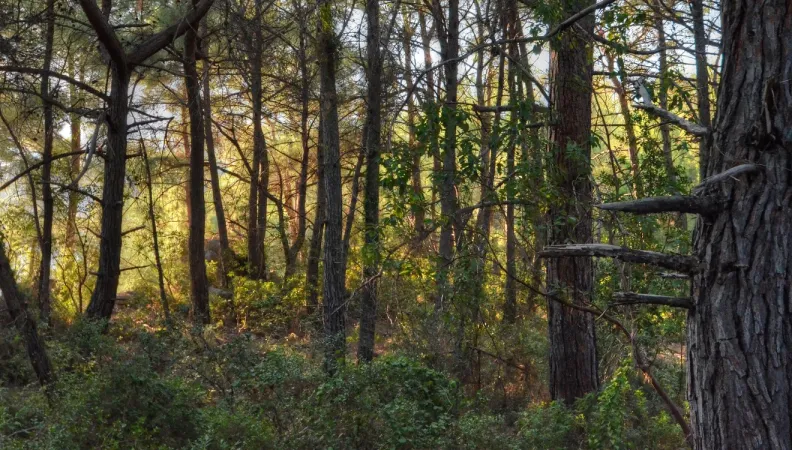Share the page
Protecting Forests in Türkiye: Climate Change Adaptation and Biodiversity Protection
Published on

Türkiye and France have teamed up in a large-scale collaborative effort to address the issue of forest adaptation to climate change. The initiative was launched using a public policy loan and a grant from AFD, and is aimed at reversing the damage done to Türkiye's forests, which cover nearly 30% of the country's land area and are home to a vast wealth of biodiversity.
Forests have long endured a vast range of pressures, and climate change has made matters worse. France and Türkiye have, however, been working together to improve conservation efforts.
Roadmaps for Better Protected Forests
Last month, Hervé Magro, the French ambassador to Türkiye, met with the General Director of Türkiye's General Directorate of Forestry (OGM), Bekir Karacabey. It was a chance to take stock of this large-scale collaboration. Among the documents presented, was the national climate change strategy for forest adaptation in Turkey and a roadmap for better integration of biodiversity conservation into forest management.
“By adopting this approach, innovative actions can be implemented in the field, and strategic documents can be drafted to guide public policy,” says Serge Snrech, AFD’s Director in Türkiye.
These documents are significant, as they help to quantify and formalize such objectives in official documents, particularly by one of the few countries that has not ratified the Paris Agreement on Climate Change. The Turkish government relies instead on voluntary agreements to implement climate change and biodiversity initiatives.
“Establishing a dialogue with Türkiye proved decisive in finalizing these strategic documents,” says Aurélien Guingand, AFD’s Project Team Manager for Biodiversity, Forests and Protected Areas. “As a result, more ambitious objectives were set, which was definitely not a given at the outset.”
Public Policy Loan and Technical Cooperation
AFD introduced two measures to improve the situation, first awarding a €150 million loan to the Turkish treasury in 2019, then launching a technical partnership the same year with ONF International (ONFI, subsidiary of the French National Forests Office), and its Turkish counterpart, OGM. The disbursement of the two loan installments was conditional on a certain number of objectives being achieved, as facilitated by this collaborative technical effort.
The initiative is based on the concept of a “PPL”: a public policy loan. AFD uses this mechanism to encourage its partner countries to commit to reforms and support investments in sectors in line with the UN's Sustainable Development Goals. This financing aims to support the Turkish government’s continued investment in forest management over the long term, a crucial contribution at a time when governments are experiencing severe financial constraints.
Commitments that Trigger Change
This cooperation has made a greater environmental impact than the three previous public policy loans allocated to Türkiye by AFD since 2011. “These loans have been used to finance good policy on climate change mitigation and biodiversity protection but there has not been enough effort put into improving the policy further,” says Aurélien Guingand. “On one side, you have the loan financing and on the other, the technical partnership, with no real connection between the two.”
Now, with this fourth PPL, a public policy matrix has been created, consisting of some forty budgetary, institutional and technical commitments – or “triggers” – across 13 fields of activity. These commitments must be fully validated by Türkiye for both loan installments to be paid (two installments of €75 million).
Thus, for the 2019 allocation, Türkiye was required to approve an investment budget of 270 million Turkish Lira (€28 million) for forestry and the rehabilitation of damaged forests, as well as set up a forest fire management plan in at least 15 regional directorates, and implement a series of pilot projects on ecotourism and avalanche risk management, for example. For the 2020 allocation, the country had to launch various long-term research projects on the effects of climate change on forests, while developing a strategy to adapt to these issues.
“French and Turkish forests are experiencing the same problems”
All parties were involved in the negotiations on this very detailed matrix: AFD, OGM, the Turkish treasury and the Ministry of the Budget. Now that all the triggers have finally been validated, the second installment is due to be paid shortly.
This would not have been possible without the hard work of ONFI on the ground, supporting the various Turkish partners in meeting their obligations. As part of the Fund for Technical Expertise and Experience Transfers (FEXTE), the ONF subsidiary received an €800,000 grant, awarded by AFD.
“We have mobilized French expertise through our partners such as the National Research Institute for Agriculture, Food and the Environment (INRAE), the French Biodiversity Agency (OFB), the National Institute of Geographic and Forest Information (IGN), Citepa and the consultancy firm Eco-Med. We have tried to build collaborative Franco-Turkish relations that will last long after the program is complete,” says Pierre-Emmanuel Leclerq, CEO of ONFI. “The problems faced in Turkish forests are the same as those in France: over-exploitation and climate change. We have to find common solutions by encouraging our experts to work together.”
More than a Dozen Projects Planned for 2021
In the field, specialists from Türkiye and France have in both countries, for example, exchanged seeds and planted nurseries to test the capacity of various tree species to adapt to future climate conditions. The situation in Türkiye foreshadows what the climate could be like in France within a few decades. Turkish experts will study French fast-growing species (e.g., maritime pine, heathland pine) to assess the adaptability of industrial species like the Calabrian pine. Tests have also been conducted where repellent is sprayed from drones for more effective pest control.
With this public policy loan, the Turkish Ministry of Agriculture and Forestry has been able to expand its biodiversity teams.
The two countries implemented approximately twenty collaborative projects in 2019, with another fifteen scheduled for 2021. Amid the Covid-19 crisis in 2020, much of the collaboration continues online.
